I Lost 70 Pounds After Stopping These 7 Things
Nikki (@nikkigetsfit) is a weight loss influencer and YouTuber who shares about her health journey via social media outlets. In a recent viral video, the weight loss warrior, who shed unwanted weight with the help of WW, reveals that ditching a few bad habits was instrumental in her success. We also asked The Diet Diva, Tara Collingwood, MS, RDN, CSSD, LD/N, ACSM-CPT, a Board Certified Sports Dietitian, to weigh in on her tactics.
She Reveals That She Lost 70 Pounds with Weight Watchers
In the video Nkki reveals that she lost 70 pounds and has "maintained that loss now for another two years." She says that a few things that she stopped doing at the start of her journey helped her succeed. "I've struggled with my weight my entire life and it's been something that I never thought I could do. It's something that I've wanted to do and just focus on my health and nutrition, and I've always loved cooking and everything, but it's something I've just always struggled with," she says.
She Stopped Eating Out
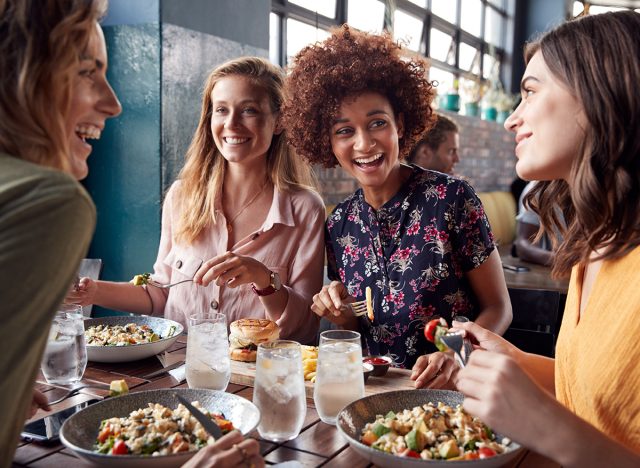
The first thing that she stopped doing was eating out one to two times a day. She explains that due to their busy schedules she and her husband would rely on "fast food and just really unhealthy, quick and easy options that were loaded with calories and just really didn't even make us feel good" for meals. When she started Weight Watchers and tracked all of her meals, she was shocked at how unhealthy they were. Even their coffee order from Dunkin' with cream and sugar was loaded with points. "It really had gotten kind of out of control realizing how high points so many fast food items were because we weren't choosing low point items, we didn't really care. It really did impact our health and I think that's where a huge amount of our weight gain came from," she said. Her first month on the program she stopped eating out altogether. "We didn't eat out the first month at all because we just wanted to kind of get away from it and just work on trying to find ways to cook at home," she said. Instead, they would make "copycat meals" at home, healthier versions of their favorite foods. "It made us excited. We realized we could still eat these foods we loved and have big portions of 'em, and it wasn't as many points as the fast food options."
RD Says: Collingwood agrees. "Most people don't realize how quickly the sugar, fat, sodium, and calories add up in fast food and restaurant food in general. Their job is to make us want their food and come back time and time again and what tastes good is sugar and fat. When you start to look up the calories and add them up, especially with the large portion sizes, it is very eye opening how quickly things add up," she explains. "When you can make it at home you can control the amount of fat, sugar, and sodium, or you can substitute healthier and lower calorie ingredients. We also tend to serve ourselves smaller portions at home than those served to us at restaurants."
Related: 14 Superfoods that Sculpt a Flat Belly
She Stopped Being "Negative" and "Mean" to Herself
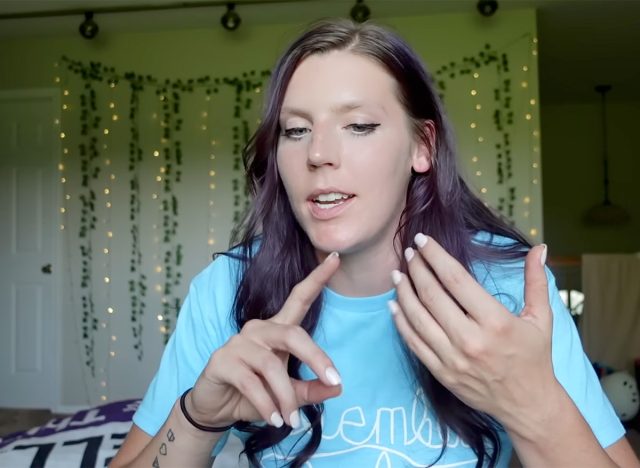
The second thing she did " was I really worked on stopping negativity," she says. "I would never say the things I say to myself to anybody else, and it just didn't make sense that I was so hard and mean on myself," she continued. She started saying nice things to herself out loud and "it really did start to make a difference in the way I thought about things, the way that I was motivated, and it slowly started to make a difference really trying to stop those negative thoughts when they came through and trying to switch them around to thinking a more positive thought or something just not as negative," she explained.
RD Says: "Negativity breeds more negativity and focusing on the positive can be very uplifting and help with making changes in your life that can make a real difference."
She Focused on Consistency
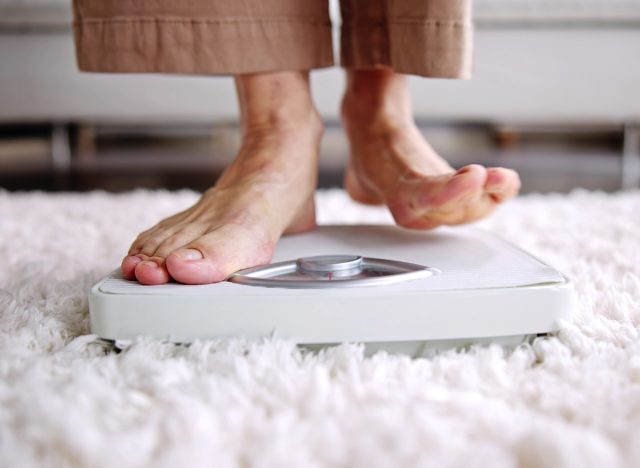
She also "stopped focusing on an end result and hitting it by a certain time" and instead "focusing on consistency." Instead of the number on the scale, she "focused on what I could control" and things that would make her health improve. This led to success on the scale. "In the long run I was able to lose the weight, but my focus was on the consistency aspect and the part that I can control and not the uncontrollables of what the number on the scale says because it changes so frequently. So when I stopped worrying so much about the end result, it really did help take so much pressure off me."
RD Says: "I always tell my clients that I am not concerned with the number of the scale, but with the behaviors that are happening. If the behavior changes, the scale will follow," Collingwood explains. "And even if weight loss doesn't happen, if behavior changes for the better, health and wellness will improve which is also a huge win."
She Rewarded Herself
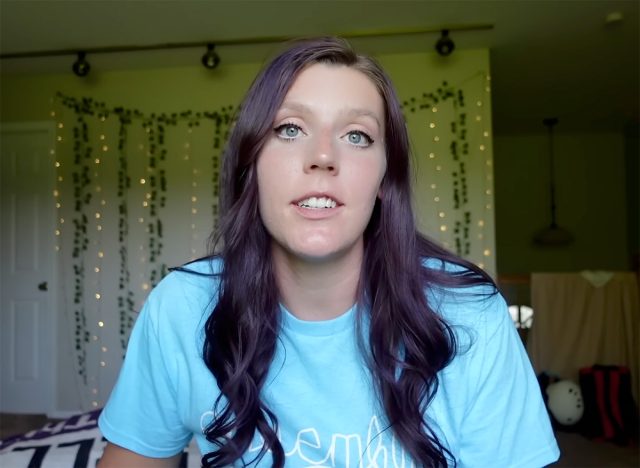
She also gave herself rewards at the end of the month " when I stayed consistent," she says. "I did one month, three months, six months, and then a year," she says, explaining that she did different rewards, and "it felt good to reward myself because it was something that I knew I had earned and I had done and I had put in the hard work for it."
RD Says: "Having something to look forward to in the form of a reward can be quite motivating and feel good when you achieve the milestone. Try to choose non-food rewards so that it is not about food but rather about the achievement," recommends Collingwood.
She Stopped Restricting Herself

She also "stopped restricting" anything. "In the past I always thought this was just the best way to go about things. I always thought that this was just what was going to make me lose weight, what was going to help me have success. I pretty much thought that I had to cut everything out that I enjoyed and only eat the things that were dried out, chicken breast, salad, peppers, and bunless burgers. I thought I had to have all the most basic diet foods that everyone thinks about when they think of stuff like that and that I couldn't have any foods that I enjoyed." However, she soon learned that "technically I could have anything that I wanted" with the WW points system, "and that really helped us because we were able to still incorporate so many of the foods that we enjoy and just using our points and deciding what's a priority, what's worth it." What she learned is that restricting herself too much led to binge eating, "and so when I restrict something, I just want it more and more and more, and then the second that I'm able to get it, it is just out of control."
RD Says: "It's not always about the 'what' you are eating but more about the 'how much,'" says Collingwood. "You can eat whatever you want and still lose weight, but you just balance the portion and frequency of having that particular food. Also balancing with physical activity helps loosen the choices as well!"
Related: 5 Signs You Are Burning Fat, Not Muscle While Exercising
She Stopped Caring About What Others Thought
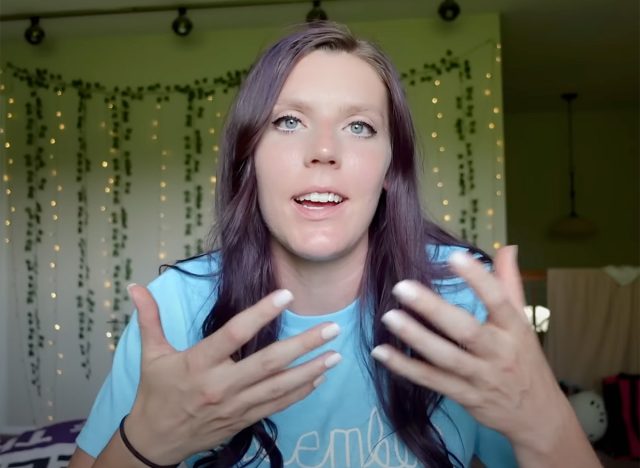
Finally, she "stopped caring what others thought," she said. She explains that when she was bigger, "I really always felt so much shame" and was "embarrassed" about her weight. "I wanted to be healthier, but I struggled so much with other people knowing that I didn't want people to know that and part of me not wanting people to know that also kept me in the position I was in." However, she stopped being afraid of telling people she wanted to get into shape. "Anyway, I just want to focus on bettering myself and the people judging people for wanting to better themselves. Like I said, they're the ones with the problem, so I just kind of thought through that and realized I just need to do what's best for me no matter what anyone thinks."
RD Says: "When you can focus on you and your health and not what other people think, you are able to focus on the right things. It is really difficult to not care at all what others think, but when you are working on yourself just for yourself rather than trying to please others to explain yourself to others you will have much more peace and happiness."
💪🔥Body Booster: An easy way to start losing weight is cutting out not only fast food, but eating out altogether. Studies have found that the more meals you eat prepared away from home, the higher your risk of cardiovascular disease, cancer, and early death.





